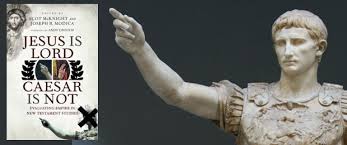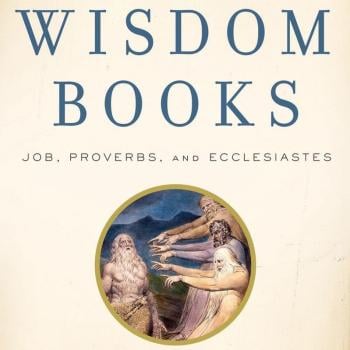Where exactly did the imperial cult come from? What were its ideological origins? The prevailing view, as Lynn Cohick points out, is that it grew out of the Greek ruler cult and perhaps more importantly in a Roman context from the private or household worship of the genius (spirit/life force) of the Roman paterfamilias, one’s chief male ancestor. The extension of this to the Emperor was rather natural since from Augustus on, the Emperor presented himself as the father of the fatherland, the father of the Roman people. The Empire then by extension was the family of the Emperor and the worship of his genius by pouring out libation to him at a family meal was a sort of pledge of allegiance to the state, affirming he was their ‘father’. There was just one catch— to the degree this was a form of ancestor worship, one needed to be dead first to be the object of worship. This is why, as we saw in the previous post, even Nero, and even well into his erratic reign, said he didn’t want a temple built to worship him— he wasn’t dead, yet! But as Cohick points out, there was a further issue. Asking a patrician, such as a senator, to worship someone else’ ancestor was beneath their social rank. In principle they were of the same rank as the Emperor. They preferred to worship a living Emperor as a god instead!
Make no mistake, as Cohick points out (p. 168), the imperial cult was a privately funded enterprise (not a state funded one), and it was based entirely in the whole benefaction system. In the reciprocity cycles of the Empire, it was an honors for benefactions trade off which reinforced the stratification of society, for those giving the honors were the social inferiors, and those receiving them the benefactors. As Cohick then adds (p. 169), calling Jesus Lord does not neatly parallel the meaning of calling Caesar Lord. Cohick, contrary to one previous article in this volume, provides evidence there was an imperial cult running in Philippi in the first century A.D. and furthermore, it involved the worship of Livia Augusta, Augustus’ wife.
What was the actual situation on the ground in Philippi when Paul visited there, and later when he wrote to the new congregation there? Cohick says “When Paul visited Philippi Claudius was Emperor; the senate upon his death, declared him divine. When Paul wrote Philippians, Nero was Emperor and he did not enjoy an apotheosis (transformation to deity–[indeed he probably committed suicide which was a deal breaker]). Thus during Paul’s lifetime, Romans (and everyone else but Jews) worshiped Julius Caesar,Augustus, Livia and Claudius in the imperial cult at Philippi. For Jews such as Paul, the imperial cult was part of the larger system of idolatry that plagued his era and that of his ancestors.” (p. 170). Idolatry was nothing knew, nor was false gods.
Cohick goes on to critique both post colonial and feminist readings of Paul suggesting that he is neither using hidden scripts in his letters to critique the imperial cult, nor is he just another colonialist demanding the sort of obedience and following that was typical of those with an imperial mindset. (p. 171). His congregations in the latter view are the oppressed ones, whereas Paul is one of the oppressed in the former view. Cohick concludes “I am not persuaded that Paul develops an explicit anti-imperial (or anti-imperial cult) program, nor do I think that the post-colonial and feminist hermeneutics convincingly establish the case that Paul exhibits colonial intentions” (p. 171). Did Paul ask his audience to renounce their Roman citizenship, status and privileges, since they were citizens of a different realm and reign as Warren Carter suggests? Was Paul implicitly asking Christians to be disloyal to the Emperor as Wright has suggested? Cohick suggests this is incorrect. “…it was the power,influence, and benefaction [especially the latter] of the family. not simply the power of the ruler, which was venerated. Therefore Paul was not setting up a contest between ‘gods’, Caesar and Jesus, for the imperial cult was not merely the veneration of the Emperor [remembering it also involved venerating Livia]” (p. 174).
Cohick, following Boeckmuehl, points out that Paul’s use of politeusthe invokes not a sense of civic duty (the Christian’s duty is to the Christian Empire over against Caesar’s) but rather it furthers a sense of fidelity and loyalty to the local Christian community. In Jewish lit. it means ‘following the Jewish way of life’ (2 Macc. 6.1;11.25 Josephus Vita, 12 cf. Acts 23.1). Cohick stresses that Paul is not writing in coded language, or hidden scripts. He is very open in what he is saying about Christ etc. He had not gone underground, he was proclaiming the Gospel openly above ground! In Paul’s view “the honor of being a member of God’s family is rooted in a true view of the world, while the honor granted a Roman citizen belongs in a different earthly realm, part of this age.” (p. 177). Empire is not the key interlocutor for Paul in his letters, and the Emperor not the key bad guy. That would be Satan, who does not wear a toga, and was never a human being. She goes on to point out how the term politeuma was already used by Jews in communities outside of the Holy Land to self-identify (Philo, de confusione 78; de Gigantibus 61). See p. 180. In other words, Paul is using the language in a transferred sense to talk about believers who are outside their true homeland, and so are like aliens in the world, and are awaiting their Savior to return, transform their bodies, and establish his own realm on earth, as in heaven. In Cohick’s view politeuma for Paul has an eschatological focus, and it involves a critique not of Rome but of those insisting on circumcision in order to be full part of God’s people.
In his shorter article on Colossians and Philemon, Allan Bevere (my former student and friend), gets right to the point and makes clear that the philosophy Paul is opposing in Colossae is not Roman or imperial but rather Jewish in character, that when Paul speaks of principalities that Christ has overcome, it has to do with supernatural bad guys, not local Roman officials, and so Walsh and Keesmaat’s Colossian’s Remix book is a washing machine out of kilter. Imperial criticism can’t be read into Colossians or Philemon. It just isn’t Paul’s concern in these documents. He also is right that Paul is not writing in coded language. This is in part because Paul does not see himself as a victim of human oppression. If anything he sees himself as a former oppressor when he persecuted the church. and He does not write as an oppressed person, but as one who has the victor in Christ. He trusts the sovreignty of the Savior.















